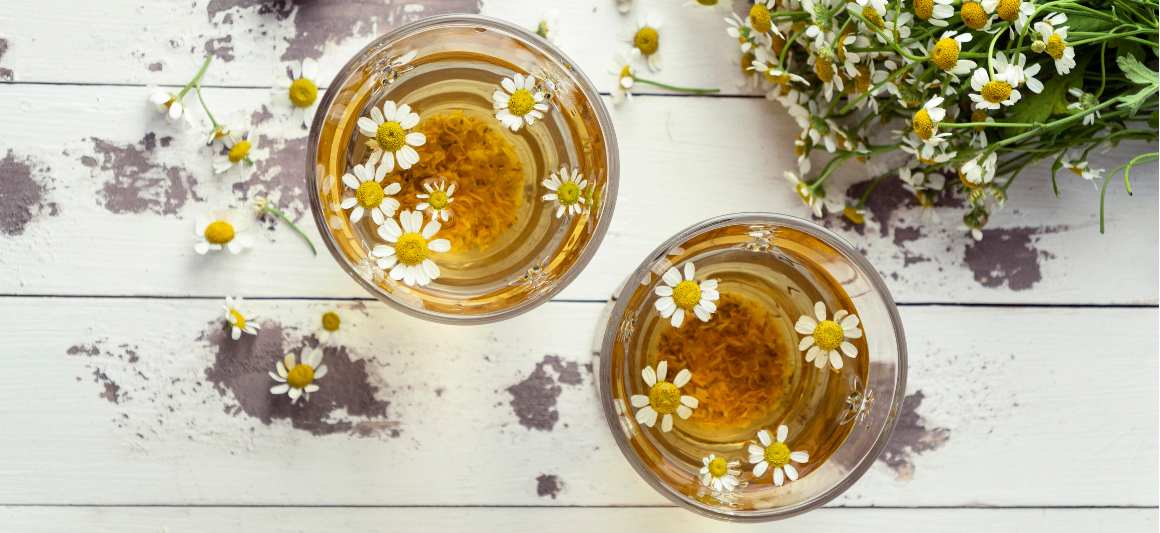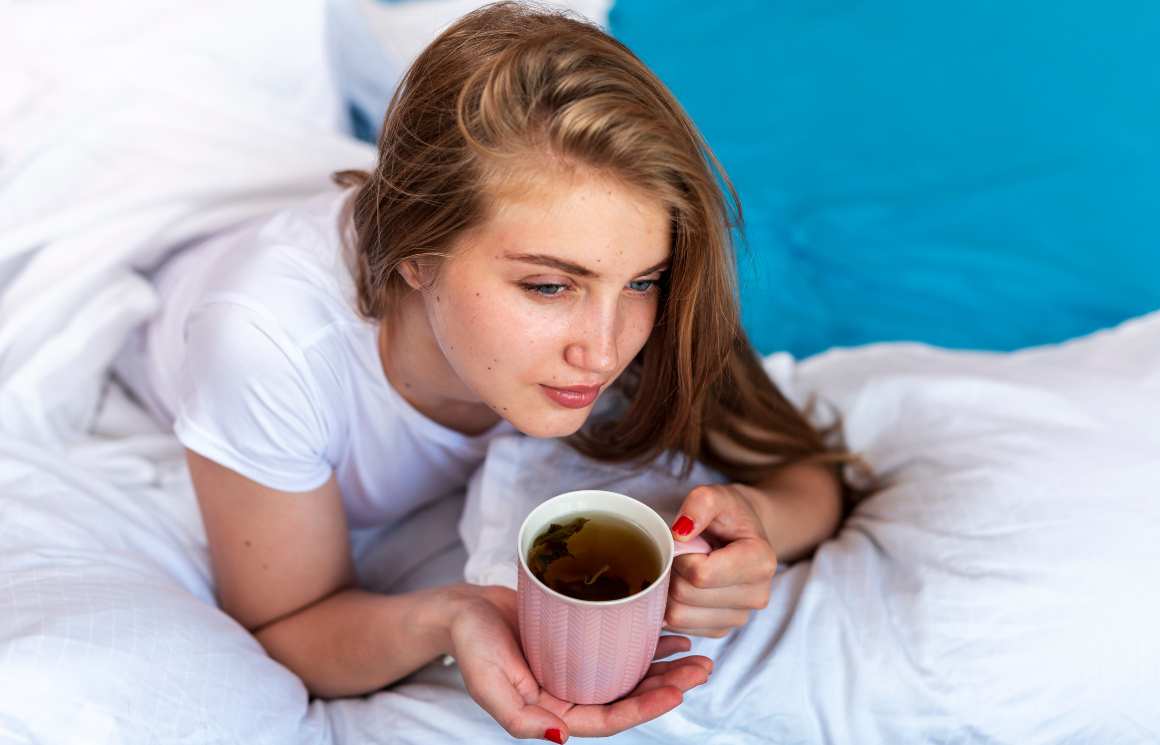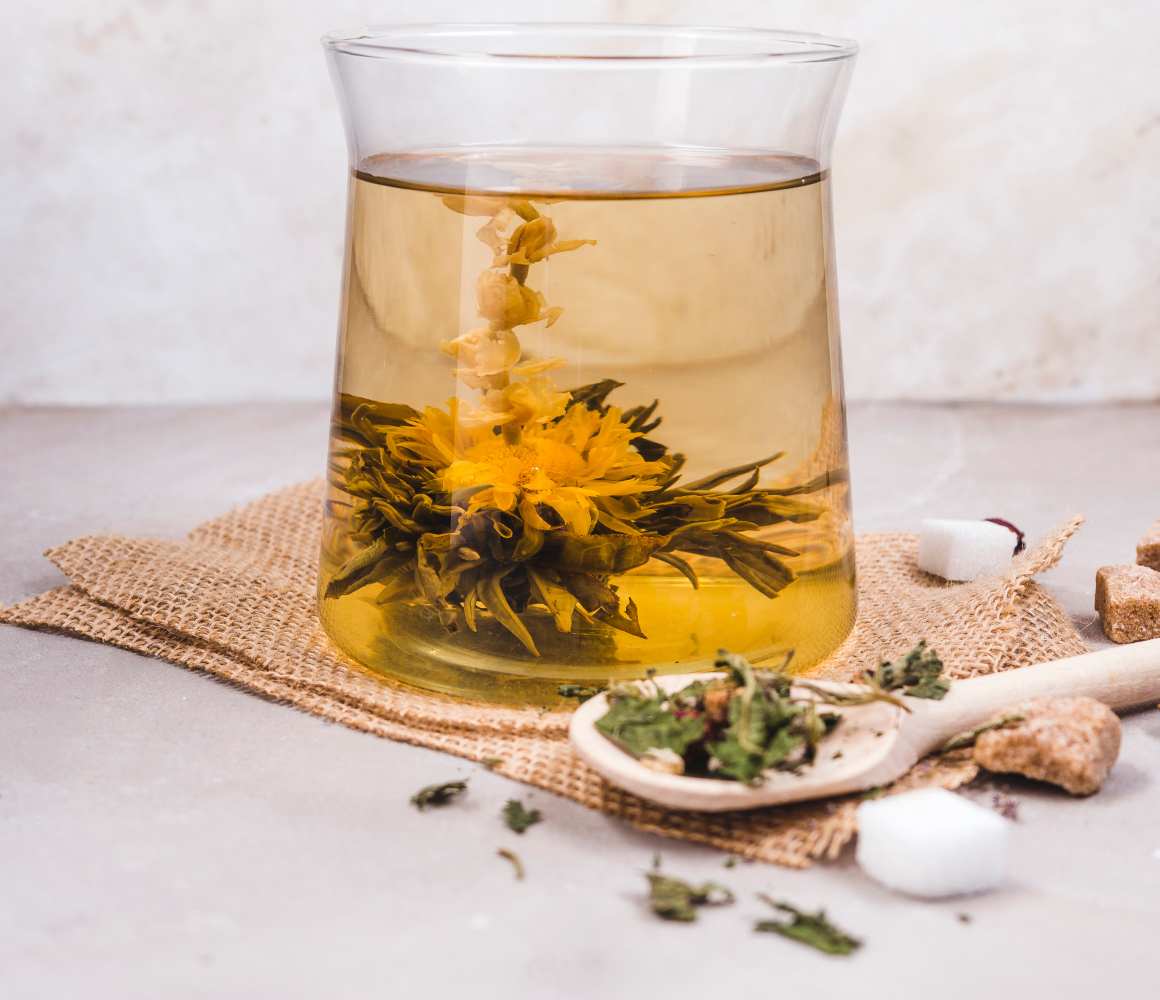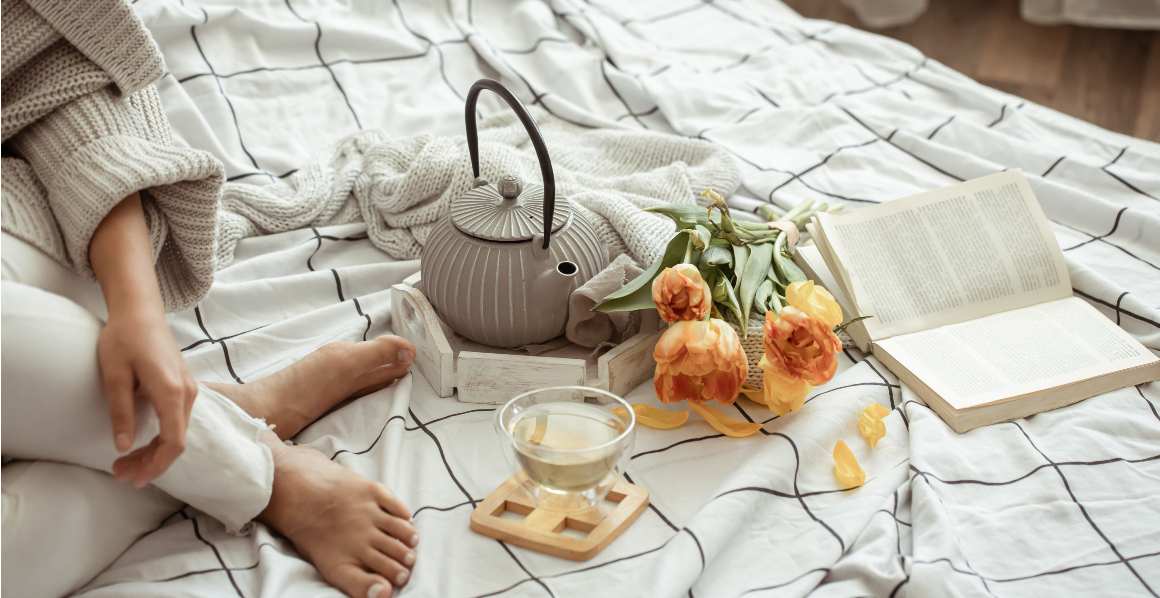The Best Tea for Sleep
Published:
Unearthing the optimal tea for slumber can be a game-changer when it comes to bettering your nocturnal repose. With countless options available, finding the perfect brew that caters to your taste buds and relaxation needs may seem overwhelming. In this comprehensive guide, we will explore various herbal teas known for their sleep-inducing properties and dive into some notable mentions of other sleep-promoting teas.
Contents:
- Chamomile Tea for Sleep
- The Science Behind Chamomile's Sleep-Promoting Effects
- How to Choose the Best Chamomile Tea
- Lavender Tea and Aromatherapy
- Valerian Root Tea - Potent but Earthy
- Lemon Balm Tea - Calming Stress Relief
- Passionflower - Quieting Racing Thoughts
- Magnolia Bark - An Ancient Sleep Aid
- Other Notable Herbal Teas for Sleep
- Popular Tea Blends to Try
- FAQs in Relation to Best Tea for Sleep
- Conclusion
We'll also discuss popular blends in the market designed specifically to improve sleep quality, as well as how aromatherapy can enhance the effects of these soothing beverages. Finally, we'll provide tips on selecting the best tea for sleep according to individual preferences and values while considering dietary restrictions and pre-bedtime routines.

Chamomile Tea for Sleep
Chamomile tea is a popular choice for those looking to improve their sleep due to its calming effects and traditional use as an insomnia and anxiety relief remedy. It has been traditionally used as a remedy for insomnia and anxiety relief, making it an excellent option for those seeking better rest.
The Science Behind Chamomile's Sleep-Promoting Effects
Chamomile contains apigenin, a flavonoid that binds to specific receptors in the brain, helping reduce anxiety and induce sleep. Studies have shown that drinking chamomile tea can lead to improved sleep quality and reduced fatigue in individuals with chronic insomnia. (source)
- Naturally caffeine-free: Unlike green tea or other caffeinated beverages, chamomile tea is naturally free of stimulants, making it ideal as a bedtime drink.
- Promotes relaxation: The soothing aroma of chamomile flowers helps create a calming atmosphere conducive to relaxation and restful sleep.
- Reduces anxiety: As mentioned earlier, the presence of apigenin in chamomile contributes towards reducing stress levels by interacting with GABA receptors in the brain.
How to Choose the Best Chamomile Tea
To ensure you're getting all the benefits from your cup of chamomile tea, consider these factors while selecting one:
- Purity: Select organic varieties without any added artificial flavors or preservatives. This ensures you're consuming the purest form of chamomile without any unwanted additives.
- Quality: Opt for high-quality brands that use whole chamomile flowers instead of crushed leaves and stems, as these provide a more potent concentration of essential oils and flavonoids responsible for its sleep-promoting effects.
- Brewing method: To extract maximum benefits from your tea, steep it in hot water (not boiling) for about five minutes before drinking. You can also add honey or lemon to enhance the flavor if desired.
Incorporating chamomile tea into your nighttime ritual could assist in bettering sleep quality, calming the mind and body, while diminishing levels of stress. Give this traditional sleep aid a try tonight.
Lavender Tea and Aromatherapy
Lavender is a well-known herb with purple flowers that has been utilized since the Roman Empire era. This fragrant plant is known to promote relaxation and enhance overall sleep quality, either consumed as a tea or through aromatherapy.
Benefits of Lavender in Improving Sleep Quality
Drinking lavender tea has been shown to help improve sleep quality by reducing anxiety levels, promoting relaxation, and providing calming effects. In fact, a study published in the Journal of Alternative and Complementary Medicine found that participants who drank lavender tea reported improved sleep quality compared to those who did not consume it. Additionally, using lavender oil for aromatherapy can also lead to better restful sleep due to its soothing scent.
Combining Lavender Tea with Aromatherapy
To maximize the benefits of both drinking lavender tea and using it for aromatherapy, consider incorporating these two methods into your bedtime routine:
- Brewing Lavender Tea: To make a cup of naturally caffeine-free lavender tea, steep one tablespoon of dried lavender buds in boiling water for about five minutes before straining. You may add honey or maple syrup if desired.
- Aromatherapeutic Use: Add a few drops of high-quality essential oil like lavender oil on your pillowcase or use an essential oil diffuser near your bed at night. This will help create a calming environment conducive to sleep.
Combining these two methods can provide an even more powerful sleep aid, as the calming effects of lavender tea work in tandem with the soothing scent of lavender oil. By incorporating both into your nightly routine, you may find yourself falling asleep faster and experiencing deeper, more restful slumber.
It's important to note that while herbal teas like lavender tea can be beneficial for improving sleep quality, they should not replace traditional sleep aids or medical advice from healthcare professionals if you are experiencing persistent sleep issues. Always consult with your doctor before trying new remedies or supplements for better rest.

Valerian Root Tea - Potent but Earthy
Despite its strong, earthy flavor and smell, Valerian root has been used for centuries to treat insomnia; sweetening it with honey or maple syrup may help make the beverage more enjoyable. To make it more palatable, try adding honey or maple syrup before consuming at bedtime.
Understanding Valerian Root's Impact on Sleep Disorders
Valerian root, a popular herbal supplement used for centuries in traditional medicine, is known for its calming effects that can help promote relaxation and reduce anxiety. It contains compounds such as valerenic acid and valepotriates which are believed to interact with the brain's neurotransmitters responsible for inducing sleep. Several studies have shown that valerian root may significantly improve sleep quality without causing adverse side effects commonly associated with traditional sleep aids like prescription medications.
Tips on Brewing the Perfect Cup of Valerian Root Tea
- Select high-quality organic valerian root from a reputable source to ensure you're getting the best possible product.
- To prepare your tea, use about one teaspoon of dried valerian root per eight ounces of boiling water. Allow it to steep for at least five minutes (or longer if you prefer a stronger flavor).
- If desired, add natural sweeteners like honey or maple syrup to enhance the taste while also reaping their health benefits.
- You can also experiment by combining other naturally caffeine-free herbs such as lemon balm or chamomile to create a more complex flavor profile and potentially increase the tea's sleep-promoting effects.
- Drink your valerian root tea about an hour before bedtime to give it time to take effect. Excessive consumption of valerian root tea may cause adverse effects, so it is important to be mindful when drinking.
Adding valerian root tea to your bedtime regimen can be a great way of dealing with sleep issues without relying on OTC drugs. With its calming properties and potential for improved sleep quality, this earthy herbal brew might just become your go-to remedy for achieving a good night's rest.
Lemon Balm Tea - Calming Stress Relief
If stress keeps you awake at night, lemon balm tea could be your go-to option. This soothing drink helps reduce anxiety levels while providing a sense of calmness before bed—ideal for those struggling with nighttime tension. Investigating the effects of lemon balm on stress-induced sleeplessness, this article will explore how to make a tea with this herb.
Exploring Lemon Balm's Role in Reducing Stress-Induced Insomnia
Studies have shown that lemon balm (Melissa officinalis) has calming effects on the nervous system due to its active compounds such as rosmarinic acid and triterpenoids. These components help promote relaxation, reduce anxiety, and improve sleep quality by increasing the production of gamma-aminobutyric acid (GABA), a neurotransmitter responsible for inducing sleepiness and relaxation.
In addition to improving sleep quality, lemon balm is also known for its ability to alleviate symptoms of restlessness or irritability associated with mild cases of insomnia. As a result, drinking a cup of warm lemon balm tea can help you unwind after a long day and fall asleep more easily.
Preparing Lemon Balm-Infused Beverages
- Select high-quality ingredients: To ensure maximum benefits from your herbal tea experience, choose organic dried lemon balm leaves or fresh ones if available. Organic options are free from pesticides which may interfere with the herb's natural properties.
-
Brewing method:For optimal results when preparing your infusion:
- Use one teaspoon of dried lemon balm leaves or 1-2 tablespoons of fresh leaves per cup.
- Pour the boiling liquid over the herb and let it steep for around 10 minutes to allow the beneficial components to be released into your beverage. This allows the active compounds to be released into your drink effectively.
- Add natural sweeteners: If you prefer a sweeter taste, consider adding honey or maple syrup as they contain additional health benefits compared to processed sugar alternatives.
Incorporating lemon balm tea into your nightly routine can help ease stress-related sleep issues and improve overall sleep quality. Give this calming herbal remedy a try tonight for a more restful night's sleep.

Passionflower - Quieting Racing Thoughts
Passionflower contributes positively towards better shut-eye by reducing stress-related symptoms such as racing thoughts or nervous tension—ultimately leading you into deeper slumber faster than usual. This beautiful, exotic plant has been used traditionally for centuries to treat anxiety and sleep disorders.
The Science Behind Passionflower's Calming Effects
A study published in the journal Anesthesia & Analgesia found that passionflower extract significantly reduced preoperative anxiety levels among patients undergoing surgery. Researchers believe this calming effect may be due to its ability to increase gamma-aminobutyric acid (GABA) levels in the brain, which helps regulate mood and induce relaxation. Another study published in Phytotherapy Research showed that participants who consumed passionflower tea experienced improved sleep quality compared to those who drank a placebo tea.
Brewing the Perfect Cup of Passionflower Tea
- Select high-quality ingredients: Opt for organic, dried passionflowers from reputable sources. Shop for organic, dried passionflowers from health food stores or websites like Amazon.
- Determine the right dosage: A general guideline is one teaspoon of dried flowers per cup of boiling water; however, consult with a healthcare professional before consuming any herbal supplements if you have existing medical conditions or are pregnant/breastfeeding.
- Brew correctly: Steep the dried flowers in hot water for about ten minutes before straining out solids using a fine mesh sieve or tea infuser basket. For a sweeter taste, consider adding honey or maple syrup to your passionflower tea.
- Enjoy at the right time: Drink passionflower tea about an hour before bedtime to allow its calming effects to take hold and help you drift off into restful sleep.
Incorporating passionflower tea into your nightly routine can be a natural way to combat sleep issues and improve overall sleep quality. It is vital to seek advice from a medical professional prior to using passionflower tea, particularly if you are taking medications or have existing health issues. By choosing high-quality ingredients and brewing the perfect cup, you'll be well on your way towards enjoying the benefits of this soothing herbal remedy for better sleep.
Magnolia Bark - An Ancient Sleep Aid
Magnolia bark might not appeal taste-wise; nevertheless, it's available both in supplement form or brewed like regular tea leaves. This ancient Chinese medicine ingredient contains compounds that help induce drowsiness without causing any adverse side effects common with conventional sleeping pills.
Understanding Magnolia Bark's Sleep-Enhancing Properties
The sleep-enhancing properties of magnolia bark can be attributed to its active compound called magnolol, which is known for its ability to reduce anxiety and promote relaxation. Studies have shown that magnolol interacts with the GABA receptors in our brain, helping us achieve a state of calmness necessary for restful sleep. Additionally, magnolia bark has been found to contain other bioactive compounds such as honokiol, which also contribute to improved sleep quality by reducing stress levels and promoting relaxation (source).
Comparing Magnolia Bark Supplements and Teas
If you're considering incorporating magnolia bark into your bedtime routine, there are two primary options: supplements and teas. Here's a quick comparison:
- Supplements: Magnolia bark supplements come in various forms such as capsules or tablets containing standardized extracts of the herb. These products offer precise dosages making it easier for users to monitor their intake while ensuring consistent results.
- Teas: Brewing a cup of magnolia tea involves steeping dried magnolia barks in hot water for several minutes before consumption. Although this method may not provide an exact dosage compared to supplements, drinking tea offers additional benefits like hydration and ritualistic relaxation associated with the tea-drinking experience.
When choosing between supplements and teas, consider factors such as convenience, personal preference, and taste. For further guidance on which option to choose, it may be best to seek the advice of a healthcare professional who can recommend the most suitable solution based on your individual needs.
Incorporating magnolia bark into your nighttime routine can be an effective way to combat sleep issues without relying on traditional sleep aids. Whether consumed as a supplement or brewed into a soothing cup of tea, this ancient remedy has proven its worth in promoting restful slumber for countless individuals seeking relief from insomnia and other sleep problems.

Other Notable Herbal Teas for Sleep
Apart from the top six contenders mentioned above, some other notable mentions include lemongrass—an old folk remedy known for boosting immunity, promoting sound rest, and relieving pain—and mint, a naturally caffeine-free alternative perfect for those who prefer milder flavors in their nighttime beverage choices.
Exploring Lemongrass' Benefits on Sleep Quality
Lemongrass is a popular herb used in traditional medicine across various cultures. It has been found to possess antioxidant and anti-inflammatory properties, which may contribute to its sleep-promoting effects. Additionally, lemongrass contains compounds that help reduce anxiety levels and induce relaxation—both crucial factors when it comes to improving sleep quality. To achieve the calming effects of lemongrass, try steeping dried or fresh leaves in hot water for 5-10 minutes.
Mint Teas - Peppermint vs Spearmint for Relaxation
Mint teas are another excellent option if you're looking for a soothing drink with mild flavors. Both peppermint and spearmint have calming effects that can help promote relaxation before bed:
- Peppermint: Known primarily as an effective remedy against digestive issues like bloating or indigestion (source), its menthol content also makes it useful in reducing stress-related symptoms such as headaches or muscle tension.
- Spearmint: This milder cousin of peppermint offers similar benefits but with a sweeter taste. It has been found to possess antioxidant and anti-inflammatory properties, which may contribute to its sleep-enhancing effects.
When choosing between the two, it ultimately comes down to personal preference in terms of flavor intensity. No matter what you decide, making either peppermint or spearmint tea is easy; just steep the leaves in hot water for around five to ten minutes before going to bed.
Popular Tea Blends to Try
For a more comprehensive approach to improving your sleep quality and unique flavor experience, try one of the popular tea blends combining various herbs known for their sleep-promoting properties. These blends can offer a more comprehensive approach to improving your sleep quality and provide a unique flavor experience.
Reviewing Pukka's Night Time Herbal Blend
Pukka's Night Time tea is an excellent example of a well-crafted herbal blend designed specifically for promoting restful sleep. This caffeine-free infusion combines chamomile and lavender flowers—two powerful sleep aids—with other calming ingredients such as licorice root, oat flowering tops, and limeflower. The result is a soothing cup of tea with pleasant floral notes that help induce relaxation before bedtime.
Examining Celestial Seasonings' Sleepytime Tea Ingredients
Another popular option among sleep teas is Celestial Seasonings' Sleepytime Tea. This comforting blend features lemon balm—an effective stress-reliever—as its primary ingredient, along with oatstraw and skullcap which have been traditionally used as natural remedies for insomnia. Additionally, this blend includes spearmint leaves for added flavor without any stimulating effects like those found in peppermint.
To further enhance your nighttime routine and improve your overall sleep quality, consider incorporating some additional elements into your evening ritual:
- Create a relaxing environment by dimming lights or using soft lighting such as candles or fairy lights.
- Incorporate essential oils like lavender oil or valerian root extract into your bedtime routine, either through a diffuser or by applying them directly to your skin.
- Practice mindfulness meditation or deep breathing exercises to help calm racing thoughts and reduce anxiety before sleep.
By experimenting with various herbal teas and incorporating additional relaxation techniques, you can create a personalized approach to promoting restful sleep. Whether you prefer the soothing floral notes of chamomile and lavender in Pukka's Night Time tea or the calming lemon balm found in Celestial Seasonings' Sleepytime Tea, there is likely an ideal blend out there for you. Don't be hesitant to explore distinct mixtures until you stumble upon one that suits your special requirements.
FAQs in Relation to Best Tea for Sleep
What's the best tea for sleeping?
The best tea for sleep is subjective, as different people may prefer different flavors and herbal properties. However, some popular choices include chamomile, valerian root, lavender, lemon balm, passionflower, and magnolia bark teas. These herbs are known to promote relaxation and improve sleep quality. Experiment with various options to find the one that works best for you.
Is it okay to drink sleepy tea every night?
Yes, it is generally safe to drink herbal teas specifically designed for sleep every night. Most of these teas contain natural ingredients without caffeine or other stimulants that could disrupt your sleep cycle. However, if you have any allergies or medical conditions that might be affected by certain herbs in the tea blends, consult a healthcare professional.
Does chamomile tea really help you sleep?
Chamomile tea has been found to help induce relaxation and improve overall sleep quality due its calming effects on the nervous system. It contains an antioxidant called apigenin which binds to specific receptors in your brain responsible for reducing anxiety levels and promoting restful slumber.
Conclusion
In conclusion, choosing the best tea for sleep depends on personal preferences and values. Chamomile tea is a common pick due to its soothing qualities, whereas valerian root tea has an intense, earthy flavor that can help induce tranquility. Lavender tea and lemon balm tea are also great options for reducing anxiety levels before bed, while passionflower tea helps reduce stress-related symptoms for deeper slumber. Additionally, blends like Pukka's Night Time Blend or Celestial Seasonings Sleepytime Tea offer convenient options with added ingredients like chamomile and lavender.








